Joint Russia-OHCHR projects under the Framework for Cooperation
About OHCHR
.png) The Office of the United Nations High Commissioner for Human Rights (OHCHR) helps protect and promote all human rights around the world. Headquartered in Geneva, the Office is also present in over 50 countries. OHCHR works to ensure the enforcement of universally recognized human rights norms, including through promoting both the universal ratification and implementation of human rights treaties and respect for the rule of law. It also aims to remove obstacles to the full realization of all human rights and to prevent or stop human rights abuses. For more information please visit www.ohchr.org.
The Office of the United Nations High Commissioner for Human Rights (OHCHR) helps protect and promote all human rights around the world. Headquartered in Geneva, the Office is also present in over 50 countries. OHCHR works to ensure the enforcement of universally recognized human rights norms, including through promoting both the universal ratification and implementation of human rights treaties and respect for the rule of law. It also aims to remove obstacles to the full realization of all human rights and to prevent or stop human rights abuses. For more information please visit www.ohchr.org.
The Office's priorities, expected accomplishments and strategies are set out in the OHCHR Management Plan 2014-2017.
OHCHR’s thematic priorities are strengthening international human rights mechanisms; enhancing equality and countering discrimination; combating impunity and strengthening accountability and the rule of law; integrating human rights in development and in the economic sphere; widening the democratic space; and early warning and protection of human rights in situations of conflict, violence and insecurity.
OHCHR in the Russian Federation
Background
Following the agreement between the High Commissioner for Human Rights (OHCHR) and the Government of the Russian Federation, an OHCHR presence was established within the United Nations Country Team (UNCT) in the Russian Federation in January 2006. The High Commissioner's two visits to the Russian Federation in 2005 and 2006 provided opportunities to consolidate and strengthen the cooperation with national partners. Throughout the year 2007, comprehensive consultations concerning contents and forms of longer-term cooperation to promote human rights in the Russian Federation took place with OHCHR’s counterparts in Moscow. As a result, the OHCHR Framework for Cooperation with the Russian Federation for 2007 and beyond was elaborated and approved, through an exchange of letters between the High Commissioner and the Minister of Foreign Affairs in August 2007.
From March 2008 to May 2016, a Senior Human Rights Adviser was deployed in Moscow to oversee and guide the planning and implementation of concrete activities within the agreed Framework. To implement OHCHR-Russia joint projects under the Framework for Cooperation (FfC), OHCHR established partnerships with Russian government institutions at the central and regional level, UN agencies, civil society, including NGOs, academia and other interested parties, under the following four clusters of the FfC:
- rule of law;
- equality and tolerance;
- education and information on human rights;
- mainstreaming human rights within the UN Country Team in the Russian Federation.
Although the function of the Senior Human Rights Adviser was discontinued in May 2016, the implementation of programmatic commitments will be continued throughout 2016-2017 under the modalities engaging Joint Russia-OHCHR projects officers to report directly to the OHCHR Headquarters.
2011-2016 Joint Russia-OHCHR projects under the Framework for Cooperation
Education
OHCHR continued supporting the Human Rights Master Programme (HRMP), building on the pattern of the European Master's Programme in Human Rights and Democratisation (E.MA, European Inter-University Centre, Venice) and contributing to the Second phase (2010-2014) of the World Programme for Human Rights Education. The HRMP is realized by the Consortium of Universities initially composed of three Moscow universities: Peoples’ Friendship University of Russia (PFUR), Moscow State Institute of International Relations (MGIMO), Russian State University for the Humanities (RGGU), and currently incorporating 9 universities, including Kazan Federal University (KFU), Perm State University (PSU), Voronezh State University (Voronezh) and three universities in Yekaterinburg – Ural State Law University (USLU), Ural Federal University (UrFU) and Liberal arts university. The core courses of the curriculum have been specifically developed or adjusted for the Master Programme, in particular the courses on the UN human rights mechanisms and regional experience in the area of human rights protection. The lectures of invited foreign professors and practitioners as an integral part of the curriculum are scheduled for the Master students - on average, 10-12 foreign lecturers a year. The students are given the opportunity to attend Venice School of Human Rights as well as to have a research internship in one of the EIUC universities, Ombudsperson’s Office, government institutions or non-governmental human rights organisations.
As of June 2016, in total 92 students graduated from the Master Programme since its launch. The graduates are employed inter alia by government institutions, human rights NGOs, international organizations, educational institutions and UN agencies.
Summer School
The Consortium of Universities implementing the HRMP annually holds a Summer School on Human Rights at one of the universities of the Consortium. The Summer Schools are open not only for Human Rights Master students but also for any interested students as well as university professors, human rights practitioners and activists. The First and Second Summer Schools were held in Moscow in 2011 and 2014 hosted by the PFUR. The Third School was held in Kazan at the KFU in 2015.
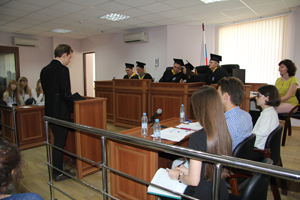 Moot Court competition, 2016 Summer School on Human Rights, Voronezh
Moot Court competition, 2016 Summer School on Human Rights, Voronezh
In 2016 Voronezh State University hosted the Fourth Summer School. Dedicated to 50th anniversary of the adoption of ICCPR and ICESCR, the summer school focused on diverse thematic issues related particularly to the interaction between state and civil society in the realization of Covenants at national levels. More than 130 graduate students from 25 Russian universities were given an opportunity to interact with more than 30 human rights experts and practitioners, as well as international guest lecturers from 10 countries representing academia, international organizations and NGOs.
These Schools are aimed at increasing awareness on human rights and strengthening practical skills and knowledge in the area of human rights protection among students and practitioners in Russia.
Cooperation with national partners
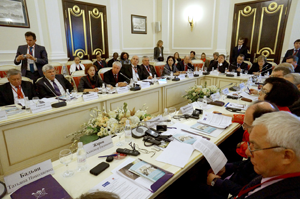 Workshop for Russian ombudspersons “Promoting Equality and Combating Discrimination”, Saint-Petersburg, 2013
Workshop for Russian ombudspersons “Promoting Equality and Combating Discrimination”, Saint-Petersburg, 2013
OHCHR closely cooperates with the federal and regional Commissioners on Human Rights (Ombudspersons) in the Russian Federation. Since 2012, several workshops and conferences for the federal and regional ombudspersons were organized with the participation of international experts. The events covered a variety of issues such as UN human rights mechanisms’ functioning and cooperation with National Human Rights Mechanisms (NHRI), Paris and Belgrade Principles; promotion of equality and fight against discrimination; rights of indigenous peoples; women’s rights protection; and methodology of ombudspersons’ reports development. The workshops were aimed at technical assistance and capacity-building of Russian ombudspersons and strengthening their cooperation with the UN human rights system. In particular, the September 2015 round table devoted to the implementation of international standards on human rights was held jointly by OHCHR and the Council of Europe (CoE). Participating human rights commissioners increased their knowledge on the European and UN human rights system, as well as their jurisprudence, including in respect of the Russian Federation.
Since 2013, upon the request of the Russian Ministry of Foreign Affairs, OHCHR annually organizes a Human Rights Orientation Programme for Civil Servants of the Russian Federation at the OHCHR Headquarters in Geneva. The purpose of the Programme is to familiarize the participants with the work and functioning of UN human rights mechanisms, including the UPR, Special Procedures and Treaty Bodies, as well as with the role of OHCHR in supporting these mechanisms. Taking into account that more than 40 senior civil servants attended the Programme since its launch in 2013, this technical cooperation initiative became a reference point for strengthening and consolidating coordination efforts between the Government officials involved into the reporting process and interaction with the human rights mechanisms.
Human rights promotion and vulnerable groups
Rights of Indigenous people
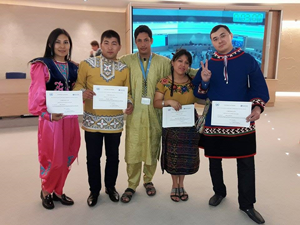 Participants of Russian-speaking component of the OHCHR Indigenous Fellowship Programme, 2016
Participants of Russian-speaking component of the OHCHR Indigenous Fellowship Programme, 2016
OHCHR facilitates the Russian-speaking component of the OHCHR Indigenous Fellowship Programme, the first stage of which is annually held at the Peoples’ Friendship University of Russia.
Joint Russia-OHCHR projects include organization of and participation in different events dedicated to the issue of business and indigenous peoples’ rights.
In 2015, with the support of OHCHR, the Sakhalin Energy Investment Company Ltd. published “Universal Human Rights Declaration and UN Declaration on the Rights of Indigenous Peoples in languages of indigenous small-numbered peoples of the North of Sakhalin region”.
Women’s rights
Some of the joint Russia-OHCHR projects concern the issue of prevention of violence against women. In particular, OHCHR representatives annually take part in the events held within the UN Campaign “16 Days of Activism against Gender Violence” along with other UN agencies, civil society and the Russian Union of Journalists. OHCHR also provides assistance in the implementation of recommendations of the Committee on the Elimination of Discrimination against Women (CEDAW, 46th session, 2010), in particular in adopting the national law on domestic violence.
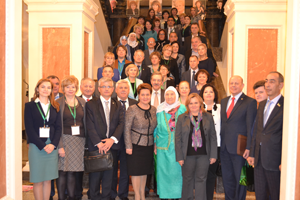 International Forum “A Muslim Woman in the Modern World”, Kazan, 2014
International Forum “A Muslim Woman in the Modern World”, Kazan, 2014
In October 2014, the International Forum on Human Rights of Muslim Women in the Modern World was held for the first time in Kazan with the support of OHCHR. The government representatives, Russian Human Rights Commissioners, international experts and civil society addressed a wide range of issues relating to the enjoyment of women’s rights in the Republic of Tatarstan and other regions of Russia, including ways for forming gender tolerance and for combating domestic violence; strengthening the position and role of women in society; and empowering them and protecting their rights and interests. The Forum’s participants adopted a resolution containing priority steps to promote women’s participation and women’s advancement.
In March 2016, OHCHR was actively involved in organizing a round table "Equality of Rights and Opportunities in Culture and Society" in the framework of the II International Film Festival "8 Women" on promoting women’s rights in Russia. In this context, OHCHR in cooperation with other UN agencies, co-organized a special event devoted to the International Women’s Day.
OHCHR leads the UN Theme Group on Gender (GTG) in the Russian Federation. The Group supports initiatives of the government and civil society aimed at women empowerment. Work of the GTG is based on a number of international documents, including the Convention on the Elimination of All Forms of Discrimination against Women (CEDAW), the Beijing Platform for Action (BPA) and other.
Rights of Persons with Disabilities
Joint Russia-OHCHR projects also cover the rights of persons with disabilities. In particular, with the support of OHCHR grant (2011), the Russian civil society organisation “Perspectiva” implemented a project that led to the adoption of the national law “On education in the Russian Federation” that promotes inclusive and integrated education of persons with disabilities. Besides, OHCHR representatives participated in special advocacy events devoted to the rights of persons with disabilities held by governmental and civil society institutions.
Joint Russia-OHCHR projects include cooperation with the Office of the Ombudsperson in Saint-Petersburg by supporting the events dedicated to the rights of persons with disabilities. In 2012, the event on the occasion of the ratification of the Convention on the Rights of Persons with Disabilities by the Russian Federation was held in Saint-Petersburg jointly with disabled peoples’ organisations. In 2015, the interregional conference was conducted together with the Federal Penitentiary Service of Russia “Life Quality and the Level of Medical Aid to Persons with Disabilities in the North-West Federal District’s Penitentiary System”.
OHCHR is a part to the Group of Friends of the Disability Convention leaded by UNIC – informal working group that brings together the representatives of the Government, civil society, including organizations dealing with the issues of disability, as well as interested UN agencies and structures.
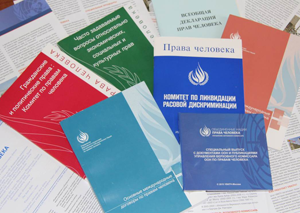 UN OHCHR publications
UN OHCHR publications
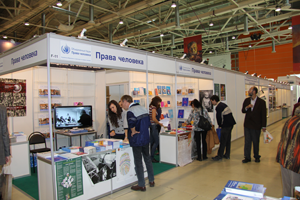 2011 Moscow International Book Fair
2011 Moscow International Book Fair
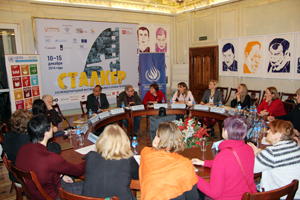 Roundtable “Human Rights through Cinematography”, 2016 “Stalker” Film Festival
Roundtable “Human Rights through Cinematography”, 2016 “Stalker” Film Festival
Dissemination of information, human rights mainstreaming
Since 2011 OHCHR maintains the Russian version of the main OHCHR web-site (www.ohchr.org) from Moscow.
Since the first edition in 2010, OHCHR and Russia continue disseminating the CD-ROM with UN documents and OHCHR publications in Russian, regularly updating information and adding, inter alia, latest Russia reports related to the UN human rights mechanisms’ reporting procedure. It is used as a universal human rights tool for the wide public (distributed at public events) as well as for government institutions and civil society organisations dealing with human rights.
OHCHR has its Facebook page where general highlights in the area of human rights as well as joint OHCHR-Russia activities are covered regularly. You can join it at https://www.facebook.com/OHCHRRussia.
Articles about joint OHCHR-Russia activities or events are regularly published in the bi-monthly Bulletin “UN in Russia”, Moscow. You can read the materials here - http://www.unrussia.ru/ru/documents/bulletin
From 2009 to 2014 OHCHR participated in the Moscow International Book Fair annually held in September. Under the common UN stand “UN in Russia”, OHCHR publications in Russian and English, as well as CD-ROMs with UN documents and publications in Russian and other hands-outs are displayed and disseminated.
OHCHR annually participates in the International Human Rights Film Festival “Stalker” held on the Human Rights Day. OHCHR co-sponsors the Festival and has its own special prize of the UN High Commissioner for Human Rights. During the Festival OHCHR traditionally holds events devoted to the Human Rights Day theme with the participation of students, journalists, experts and human rights defenders.
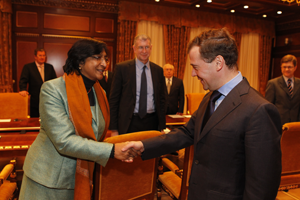 Official visit of the UN High Commissioner Navi Pillay to Russia, 2011
Official visit of the UN High Commissioner Navi Pillay to Russia, 2011
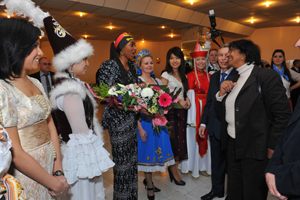 UN High Commissioner Navi Pillay in RUDN University, 2011
UN High Commissioner Navi Pillay in RUDN University, 2011
Official visits to the Russian Federation
Visit of the High Commissioner
The High Commissioner for Human Rights Ms. Navy Pillay visited the Russian Federation from 13 to 19 February 2011. She met with the President of the Russian Federation, Government ministers, Prosecutor General, judicial officials, Russian ombudspersons, civil society organisations and human rights defenders. Read more about the visit - http://www.ohchr.org/EN/NewsEvents/Pages/HCMissionToRussia.aspx
Visit of Special Rapporteurs
From 16 to 27 April 2012, Ms. Farida Shaheed, UN Special Rapporteur in the field of cultural rights, was in the Russian Federation with an official visit upon invitation of the Russian Government. She visited Moscow, Saint-Petersburg, Altay Krai, and the Republic of Tatarstan. Read more about the visit - http://ap.ohchr.org/documents/dpage_e.aspx?si=A/HRC/23/34/Add.1
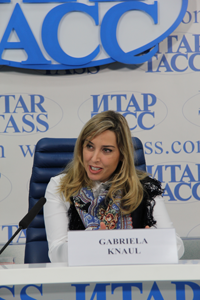 UN Special Rapporteur on the independence of judges and lawyers, visit to Russia, 2013
UN Special Rapporteur on the independence of judges and lawyers, visit to Russia, 2013
From 15 to 25 April 2013, Ms. Gabriela Knaul, UN Special Rapporteur on the independence of judges and lawyers, carried out a follow-up visit to the Russian Federation. During her eleven-day visit, Ms. Knaul met with Government representatives, members of Parliament, judges and members of national judicial institutions, federal and regional ombudspersons, prosecutors, lawyers, international and local non-governmental organizations, and UN agencies in the cities of Moscow, Saint-Petersburg, Rostov-on-Don, Azov, and Nizhny Novgorod. Read more about the visit - http://ap.ohchr.org/documents/dpage_e.aspx?si=A/HRC/26/32/Add.1

